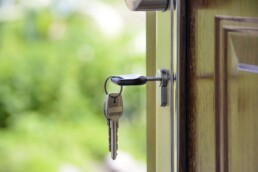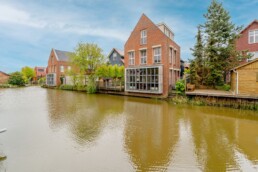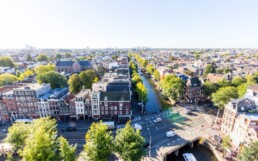5 Onmisbare Tips voor het Succesvol Kopen van een Huis in Amsterdam
Wij kopen al meer dan 20 jaar huizen aan voor expats in Amsterdam en omstreken. Toch weten ook steeds meer Nederlandse klanten ons te vinden. Speciaal voor hen heb ik dit stukje in het Nederlands geschreven: 5 onmisbare tips voor iedereen die in de Amsterdamse regio een huis wil kopen.
Tip 1: Begin met sparen voordat je denkt aan een huis kopen
Voordat je een woning gaat kopen, is het belangrijk om een goed financieel plan te hebben. Voor de aankoop van een huis heb je al snel 2-6% van de koopsom nodig voor kosten koper (zoals notaris- en makelaarskosten). Dit is nog exclusief mogelijke overbiedingen en het eventuele verschil tussen de koopprijs en de taxatiewaarde van de woning. Ben je jonger dan 35 jaar en koop je een huis onder €510.000? Dan kom je in aanmerking voor een eenmalige vrijstelling van de overdrachtsbelasting. In andere gevallen moet je rekening houden met een kostenpost van 4-6% van de aankoopprijs.
Tip 2: Raadpleeg een hypotheekadviseur voordat je begint met zoeken
De huizenmarkt in Amsterdam is erg snel. Daarom is het cruciaal om te weten wat je kunt lenen, zodat je snel kunt handelen wanneer je jouw droomhuis vindt. Een hypotheekadviseur kan je hierbij helpen. Zorg ervoor dat je eerlijk bent over je financiële situatie, inclusief eventuele spaargelden of leningen, zodat je weet wat jouw mogelijkheden zijn.
Tip 3: Kies voor een lokale en gediplomeerde aankoopmakelaar in Amsterdam
In Amsterdam kom je regelmatig uitdagingen tegen zoals erfpacht, Vereniging van Eigenaren (VvE), funderingsproblemen en regelgeving rondom verbouwingen. Daarom is het belangrijk om een ervaren en gecertificeerde aankoopmakelaar in de arm te nemen die de markt door en door kent. Het beroep “makelaar” is niet beschermd, dus kies bewust voor iemand met kennis van de Amsterdamse huizenmarkt. Een professionele makelaar zorgt voor begeleiding bij de bezichtigingen, onderhandelingen, en kan doorslaggevend zijn bij het sluiten van een deal.
Tip 4: Laat je niet ontmoedigen door teleurstellingen
Het kan gebeuren dat je meerdere biedingen verliest. De verschillen tussen de vraagprijs en de uiteindelijke koopprijs kunnen soms enorm zijn, en er zijn altijd mensen die meer kunnen bieden. Zorg ervoor dat je een realistisch beeld hebt van wat je kunt uitgeven en dat je weet wat de marktwaarde is van een woning. Een goede aankoopmakelaar helpt je bij het maken van strategische biedingen en voorkomt dat je onnodige fouten maakt.
Tip 5: Betaal nooit vooraf aan een makelaar in Amsterdam
In Amsterdam is het niet gebruikelijk om vooraf een makelaar te betalen. Alle betalingen, inclusief de courtage voor de aankoopmakelaar, worden veilig en transparant geregeld via de notaris. De notaris is een onafhankelijke partij die zorgt dat alle financiële transacties bij de aankoop van een woning correct verlopen. Dit geeft jou als koper de zekerheid dat alles volgens de regels gebeurt en er geen onnodige risico’s zijn. Betaal daarom nooit vooraf aan een makelaar of andere betrokken partijen; dit is simpelweg niet de standaard werkwijze in de Amsterdamse huizenmarkt.
Met deze tips ben je beter voorbereid op de huizenjacht in Amsterdam. Succes met het vinden van jouw droomhuis!
Ik ben Barry Burgemeester, 23 jaar gediplomeerd makelaar. Mijn missie is om huizenkopers goed te informeren en succesvol een huis te laten kopen.
Understanding the Woningwaarderingsstelsel
As purchase agents, we often help clients who want to buy a home as an investment to rent out. To explain the "Woningwaarderingsstelsel" (Housing Valuation System), here's what you need to know.
The Woningwaarderingsstelsel is a point-based system used to set the maximum rent for a property. It seemed like a good idea but can lead to issues. The system gives points based on the size of the home, number of outlets, and energy label. A property needs 187 points or more to qualify for the free rental market. For example, a studio under 50 m² with an A++ energy label might rent for €1,800, while a 75 m² apartment with an E label might be limited to €1,000 per month.
For many homeowners, the rent they can charge doesn’t cover their mortgage, taxes, and service costs. As a result, many decide to sell instead of rent, which reduces the number of homes available for rent.
Renters are feeling the impact. Rental prices keep rising, and no one is benefiting. As rents go up and homes are sold, more people stay with their parents longer or remain in small apartments. This makes it harder to move in with a partner or start a family.
Buying a home also comes with challenges. You need savings to cover extra costs like taxes and notary fees. More homes are coming onto the market, but the shortage is still so big that overbidding has become common—sometimes making us raise an eyebrow.
If you’re thinking about buying, make sure to budget for all the costs, stay realistic, and work with a local agent. It might be the best plan for the long run.
Why It’s Important to Attend Property Viewings in Person
Why Attending Property Viewings in Person is Important
Your real estate agent can attend a viewing and show you the property through a video call, but it’s not the same as seeing the home in person. Your agent can offer an objective opinion, but this will be **your home**. Only you can get the true feel of the space by being there.
Limited Viewing Dates
Most sellers and their agents set 2 or 3 dates for viewings. It’s important to make sure you or your partner attend at least one of them. If you miss it, there is no guarantee of a second viewing. Demand is high, so don’t count on having another chance.
High Demand Means You Need to Be Present
With today’s shortage of supply and high demand, sellers can choose from many buyers. Sellers prefer buyers who have attended the viewing in person. If you don’t, it might hurt your chances of securing the property.
Make Your Home Search a Priority
If you’re away or planning a holiday, let your agent know. It’s best to start your home search when you can commit to attending viewings in person. We understand that everyone is busy, but being a bit flexible with your schedule can make a big difference in finding your dream home.
Ready to Get Started?
I’m Barry Burgemeester a Certified Real Estate Agent serving Amsterdam, Amstelveen, Aalsmeer, Uithoorn, and the surrounding areas. With over 20 years of experience helping expats, I’m here to guide you through the process and help you find the perfect home.
Finding Your Ideal Family Home Near Amsterdam
For families looking to settle near Amsterdam, Aalsmeer, Amstelveen, Diemen, and Uithoorn offer a perfect mix of comfort and convenience. These towns provide suburban peace with easy city access, offering a range of housing options, from spacious apartments to single-family homes. The housing market is more relaxed than in Amsterdam, though still competitive.
Aalsmeer
Close to Amsterdam and Schiphol, Aalsmeer offers modern homes, including villas. With 14,199 households, 36% are families with children. Aalsmeer leads in sustainable construction, with large developments upcoming. Average list price: €583,722.
Amstelveen
Amstelveen is popular with families and expats, offering diverse housing near the city and Schiphol. With 45,149 households, 36% live alone. Over 50% of homes are single-family, and 47% are privately owned. Average list price: €660,222.
Diemen
Diemen combines urban proximity with township tranquility. With 16,669 households, 41% live alone. Developments like Holland Park attract families and professionals. Average list price: €524,818.
Ouderkerk aan de Amstel
Ouderkerk offers a peaceful setting with 6,466 households. Most homes are single-family, with 55% privately owned. Average list price: €666,756.
Uithoorn
Uithoorn’s green neighborhoods are ideal for families. With 13,747 households, 33% are families with children. The new Uithoornlijn tram connects to Amsterdam South. Average list price: €501,065.
ABOUT US
We operate as a purchase agent in Aalsmeer, Amstelveen, Diemen, Uithoorn, and the surrounding areas. Our team is dedicated to helping you find the perfect home. We're always happy to set up a Google Meet or an in-person appointment at our office to discuss your needs and guide you through the buying process.
Whether you're just starting your search or ready to make a move, we're here to assist you every step of the way.
Cold Figures vs. Reality: Home Buying Tips for 2024
In June 2024, the housing market experienced a significant shift. Prices of existing homes surged by 9.7% compared to the previous year, marking the biggest increase in two years, according to CBS Statistics. Despite this, the total number of transactions from June to June dropped by 12%, with only 14,662 homes sold. In the first half of 2024, 92,383 homes changed hands, with the average transaction price reaching €441,112.
Utrecht was the standout performer with a 17.3% price increase in the second quarter. Amsterdam followed closely with a 10.4% rise. The Hague saw prices climb by 5.9%, while Rotterdam experienced a 5.3% increase.
In Amsterdam, buyers typically pay 4.9% above the asking price. However, this figure can vary per home, so evaluating each situation individually is essential. All these statistics provide a clear picture of the 2024 market trends, but what if you're looking to buy a home? Our first expert tip is: stay positive!
Approach the Market with just 3 Home Buying Tips
Given these statistics, how can you navigate the home-buying process and stay realistic? Here are some home buying tips:
1. Understand your financial boundaries before diving into the market. Determine how much you can afford. This ensures you're ready to act quickly when you find the right home. A good financial advisor can provide invaluable guidance. They can help you understand your budget, explore financing options, and ensure you're financially prepared.
2. The demand often exceeds the supply in the housing market. Set realistic goals about what you can achieve within your budget. Understand that conditions can vary greatly depending on the location and specific property. We believe there is a house for everyone, so do not get too disappointed if you lose a bid, the home is not meant to be yours.
3. Work with a certified real estate agent who has an excellent reputation and proper qualifications. Since real estate is not a protected profession, ensure your agent is knowledgeable about local issues, especially in Amsterdam. They should understand topics like ground leases (which can affect your mortgage), moisture problems, owner associations, and foundation issues.
By keeping these points in mind, you can approach the home-buying process with confidence and clarity. Remember, preparation is key. Knowing your financial limits, seeking professional advice, and setting realistic expectations will help you navigate the market effectively.
---
My name is Barry Burgemeester, founder of Burgemeester Vastgoed, and a certified real estate agent. I have been helping expats buy their homes since 2001. If you would like to benefit from my expertise, feel free to email me at info@burgemeestervastgoed.nl
Discovering the Charm of Amsterdam's Canal Homes: A Real Estate Perspective
As a real estate agent in Amsterdam, I’ve had the privilege of exploring some of the most enchanting properties this city has to offer. Among these, canal homes stand out as true gems, combining history, charm, and modern living in a way that is uniquely Amsterdam. Let’s dive into the allure of Amsterdam’s canal homes and why they make an exceptional choice for buyers seeking something special.
A Glimpse into History
Amsterdam’s canal homes date back to the 17th century, during the Dutch Golden Age. The famous canal ring, known as the Grachtengordel, was created to accommodate the city’s growing population and thriving trade. These canals were both practical and beautiful, forming a stunning urban landscape that remains largely unchanged today. Canal homes were originally built for wealthy merchants and traders. Their tall, narrow fronts were designed to avoid high taxes based on the width of the property. Despite their narrow appearance, canal homes are often surprisingly spacious inside, extending deep into the block.
Architectural Beauty
One of the most captivating aspects of Amsterdam’s canal homes is their architectural beauty. Each house has its own unique character, often featuring ornate gables, large windows, and intricate details. The common styles include stepped gables, bell gables, and neck gables, adding to the city’s picturesque skyline. Inside, these homes often feature high ceilings, exposed wooden beams, and large windows that let in plenty of natural light. Many canal homes have been meticulously preserved and restored, offering a perfect blend of historic charm and modern amenities.
The Allure of Canal Living
Living in a canal home offers a lifestyle that is both peaceful and vibrant. The tranquil canals provide a serene backdrop, while the bustling streets and rich culture of Amsterdam are just a step away. Residents can enjoy the best of both worlds – the calm of canal-side living and the excitement of city life. Imagine waking up to the gentle sound of water lapping against the canal walls, sipping your morning coffee while watching boats glide by, and taking leisurely walks along tree-lined canals. For many, this is the epitome of a dream lifestyle.
Practical Benefits
Beyond their beauty and history, canal homes offer several practical benefits. Their central location means easy access to Amsterdam’s top attractions, shops, restaurants, and cultural venues. Many canal homes also come with private gardens or terraces, providing rare green spaces in the heart of the city. Additionally, these homes are built to last. Their thick walls and solid foundations offer durability and comfort. Modern renovations often include state-of-the-art insulation and heating systems, combining old-world charm with modern convenience.
Investing in a Canal Home
For those considering real estate investment, Amsterdam’s canal homes are an excellent choice. Their historical significance and unique charm make them highly desirable properties. Limited supply and high demand ensure these homes maintain their value and often appreciate over time. Amsterdam’s commitment to preserving its historic buildings means that investing in a canal home is not only financially rewarding but also contributes to the city’s cultural heritage.
Conclusion
Amsterdam’s canal homes are more than just residences; they are a testament to the city’s rich history and enduring charm. Whether you’re drawn to their architectural beauty, the allure of canal-side living, or the practical benefits they offer, owning a canal home in Amsterdam is a unique and rewarding experience. If you’re looking to immerse yourself in the magic of this historic city, there’s no better way than by making a canal home your own.
Contact me today to explore the possibilities and find your dream canal home in Amsterdam.
Why You Need an Expert Agent to Buy an Amsterdam Home
Wondering what makes Barry the top buying agent in Amsterdam? Beyond his friendly, personable service, excellent reputation, and unique service level, Barry's deep market knowledge and years of experience make him the ideal guide for any expat searching for their dream home.
Navigating the housing market in the Netherlands is challenging, especially in the Amsterdam region, where only about 30% of people own homes. This low ownership rate creates a high demand with limited supply. If you're moving from abroad, Barry can help make your transition smooth and hassle-free, ensuring you find the perfect property for your new life in the Netherlands.
Here are some of Barry's most frequently asked questions from first-time buyers to give you an insight into how his service works.
1. I have never bought property before. Where do I start?
First, determine your budget by assessing your savings and mortgage eligibility. The very first step is to find out how much you can borrow. The market is highly competitive, so you need to be ready to act quickly. Consulting a mortgage expert is crucial, and we can help with that.
You can borrow up to 100% of the property’s value, but you'll need an additional 4-6% of the property's price to cover taxes, estate agent fees, notary fees, and other expenses. Once you know your numbers, make a list of requirements and start your search online. Keep in mind that properties in the Amsterdam region often sell above the asking price. We'll always be honest with you about whether your expectations align with reality.
2. Why is it important to have an estate agent who understands my requirements?
A good agent understands your needs and explains what is feasible, making the process smooth and successful.
3. What are the benefits of working with an experienced estate agent from an expat perspective?
An experienced agent will guide you through the process, avoid pitfalls, and ensure the deal is completed smoothly. Sellers prefer working with experienced buying agents. The title "makelaar" is not protected, so make sure you team up with someone who has a diploma and knowledge.
4. Cost breakdown: If I spend €600,000 on a property, how much goes to my estate agent as commission, and what is my return on investment in choosing Burgemeester Vastgoed?
Depending on the transfer tax bill (approximately 2%), expect to pay around 5% of the purchase price in total fees. The commission for working with BV is 1.5% ex VAT. BV offers excellent responsiveness and high-quality service, ensuring a knowledgeable and personal approach. If there's a deal to be made, we'll make it happen!
5. If I have a dispute with the seller, how can Burgemeester Vastgoed assist me?
We will support our clients as much as possible. If the issue is beyond our expertise, we will advise you on the necessary steps and connect you with the right organizations to resolve the issue.
6. Negotiations are not my strong point. How does Burgemeester Vastgoed secure the best price for me, and how is this different from other agents?
At BV, we assist our clients from start to finish and negotiate the best deal possible. Our goal is client satisfaction, and we pride ourselves on our unique, personable service.
7. I’m choosing between Burgemeester Vastgoed and a cheaper, less experienced agent. Why should I choose Barry?
Value is key; choosing a cheaper agent often means lower-quality service. We provide a high level of service and charge a consistent percentage to ensure this quality. If you're serious about finding your dream home, we'd love to chat with you. Call or email us now for an appointment, and take the first step toward securing your perfect property.
For more information or to schedule an appointment, contact Barry Burgemeester at info@burgemeestervastgoed.nl today!
Expert Tips for Bidding on a Home in the Netherlands
Bidding on a property is a skill honed over years of experience. Having an expert on your side, like Barry Burgemeester, can make all the difference. Barry combines diligence with extensive knowledge to help you get the best deal. We recently sat down with Barry to answer common questions about bidding on a home in the Netherlands.
What does it mean to 'bid' on a house in the Netherlands?
Bidding on a house shows your interest in purchasing it—it’s more than just a price offer; it's a proposal. Sellers consider factors like flexibility, financing conditions, and budget. If you're unsure about presenting yourself in the best light, a real estate agent can guide you through the process.
What happens during the bidding process?
Your real estate agent will draft and submit your offer to the seller or their agent. To make you an appealing candidate, your agent will help you create a compelling profile. With many competitors vying for the same property, thorough preparation is essential.
Why should I use a real estate agent to bid on a home?
Securing your dream home involves many fast-moving parts, often negotiated in Dutch. Without fluency in the language and familiarity with the market, it can be challenging to keep up. A skilled real estate agent ensures you bid on properties that offer good value and fit your budget.
What should I know about overbidding?
The Amsterdam market is highly competitive, often requiring overbids. Determining the right amount to overbid is tricky, but a seasoned real estate agent can provide strategic advice to benefit both you and the seller.
How do I finance a bid when overbidding?
Before bidding, you need to understand the extra costs involved in overbidding. A real estate agent like Barry, with his extensive experience, can help you estimate the total cost. This way, you can secure your finances and be ready to act quickly.
What happens if I win the bid?
Congratulations! But remember, the initial verbal agreement or email confirmation isn't binding. A deal becomes binding only after all parties sign the sale and purchase agreement. Barry will guide you through this process smoothly and answer all your questions.
Get in Touch with Barry Burgemeester
Bidding can be daunting, especially in an unfamiliar market. However, with the right real estate agent, you can feel confident that your interests are prioritized. For a free consultation, email info@burgemeestervastgoed.nl today.
About Barry Burgemeester
Barry Burgemeester is a certified real estate agent with over 23 years of experience. Originally from Utrecht, he is passionate about helping clients in Amsterdam and beyond. Specializing in assisting expats, Barry expertly guides them through finding their dream home every step of the way.
The Dutch Housing Market: Trends, Government Plans, and Practical Tips
The housing market in The Netherlands is marked by high demand and limited supply, with the average house price now at €434,000. Haarlem, with an average price of €576,000, is the most expensive city, reflecting intense competition in urban areas. Even the outskirts of towns and regions like Limburg are experiencing high demand, creating a nationwide seller’s market where 56% of homes are sold above the asking price. Buying a house is quite a challenge, especially in the Amsterdam region, where only about 30% of people own homes. We will try to explain what is happening.
Government Housing Initiatives
One of the steps made to address these issues is the government’s plan to redistribute housing construction to the eastern and northern regions of the country. These areas offer more space and are less prone to flooding, aligning with climate resilience goals. This strategy aims to reduce pressure on the west and south, stimulate local economies, and foster balanced regional development.
Construction Challenges
However, the construction sector faces significant hurdles. Only 55,000 permits for new builds were issued last year, far below the needed number. High construction and labor costs and bureaucratic challenges make it difficult to scale up housing development, worsening the supply shortage.
New Builds vs. Existing Homes
Newly built homes offer several advantages: they are more sustainable, require less maintenance, and come with guarantees for any issues. However, high ground costs, construction expenses, and long building times can significantly impact your financial situation. For those needing a bridging loan to transition between homes, it is crucial to understand the terms set by banks. Such loans are less common now, and banks are more stringent. Finding an existing home might be a challenge, but the time from purchase to move-in is short, allowing you to enjoy your new home quickly.
Mortgage Rates and Financial Considerations
Current mortgage rates average 3.91% for a 10-year term, but banks are increasingly cautious. Securing a mortgage can be challenging if you do not have a steady job or have other financial obligations. Potential buyers need to be well-prepared and understand the stringent requirements that banks now impose.
Rental Market and “Wet Betaalbare Huur”
Homeownership is increasingly unaffordable for many, and the rental market also faces shortages. The new “Wet Betaalbare Huur” law aims to ensure fairer rents, with the government estimating that 300,000 homes will have to lower their rents. This law is controversial; while it seeks to protect tenants, it may lead developers and investors to sell properties, reducing rental availability and discouraging new construction.
Practical Tips for Navigating the Housing Market
- Seek Professional Guidance: Always consult with a real estate professional to help navigate the complexities of the market.
- Stay Realistic: Adjust your Wishlist to match what is feasible within your budget and the current market conditions.
- Set Priorities: Clearly define your priorities and follow the advice of experts to make informed decisions.
- Important Clauses: Do not skip critical clauses like financing reservations and surveys, even if it seems convenient.
- Set Boundaries: Establish clear boundaries for what you can afford and what compromises you are willing to make.
- Be Prepared and Patient: Be ready for a competitive market and practice patience as finding the right home may take time.
Conclusion
As a certified real estate agent with over 23 years of experience helping expats buy homes in the Amsterdam area, I understand the complexities of the Dutch housing market. With significant imbalances and regional disparities, navigating these challenges effectively is crucial. Government initiatives aim to promote sustainable growth, but new rental laws and construction hurdles add layers of complexity. You can find your dream home by staying informed and following practical tips.
For personalized assistance, feel free to email me at info@burgemeestervastgoed.nl
High Demand for Homes in Amsterdam
I have more than 20 years of experience assisting expats in finding homes. Amsterdam's popularity as a place to live has surged, but the housing supply hasn't kept up with the demand. Unlike many cities where more people own homes, Amsterdam is different. Only about 30% of properties in the city are owner-occupied.
Now, in my professional opinion, I'll dissect the situation step by step to provide a clear understanding. The majority of properties in Amsterdam are used for social housing, offices, and other purposes, which significantly limits the number of available homes for purchase. This supply-demand mismatch makes it tough, but not impossible, for people to find suitable places to live.
A Natural Shortage explained
- Homes Are Getting More Expensive
Houses in Amsterdam are becoming fancier and pricier. This is good news if you can afford to buy a great home, but it's a problem for many others. We don't see an end to it – prices in the middle and upper segments, going over 500,000 euros, are expected to keep going up. Meanwhile, the lower-priced homes are in high demand, with an average of 11 people wanting to buy each one, which means prices are going up there too.
- Building New Homes Is Slow
In a lot of places, making new houses helps when there aren't enough. But in Amsterdam, it's not happening fast. Why? Well, there's not much space, strict rules about building, and it costs a lot to build, so it's tough to match the growing need.
- Tangled Up in Rules
Amsterdam's housing market is caught in a web of rules and regulations. Some are important for the environment and safety, but too many can tangle up construction and slow things down. This only adds to the challenge of finding a suitable home.
In a nutshell, Amsterdam's housing problem is complex. With only approximately 30% of homes owned and the rest used for social housing and other purposes, the city faces unique challenges. Finding solutions to make Amsterdam more accessible to everyone is essential. Keep in mind, that I don't have a crystal ball, and like all complex topics, government policies play a significant role. Hopefully, we'll see progress, but it might not be immediate.
Why a Certified Real Estate Agent Matters
Amsterdam's housing market is quite competitive. That's why having a certified and well-known real estate agent with you, like me, is super important. Homes for sale can come and go fast, and a pro can be a big help. Agents like me understand the market well. We can act quickly when new homes are listed and help you make smart choices.
In the Netherlands, real estate agents get paid by either the seller or the buyer, not both. So, selling agents prefer working with people who have professionals on their side because it makes deals more likely to succeed. Having a trusted agent can be the secret to finding your dream home in Amsterdam's challenging housing market.
If you'd like to chat or have any questions, feel free to reach out via info@burgemeestervastgoed.nl.











